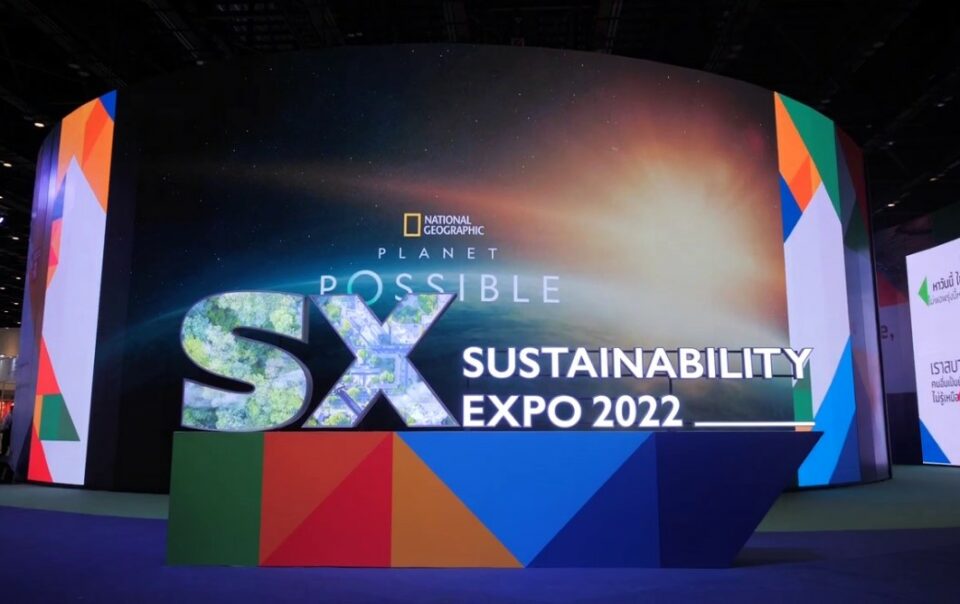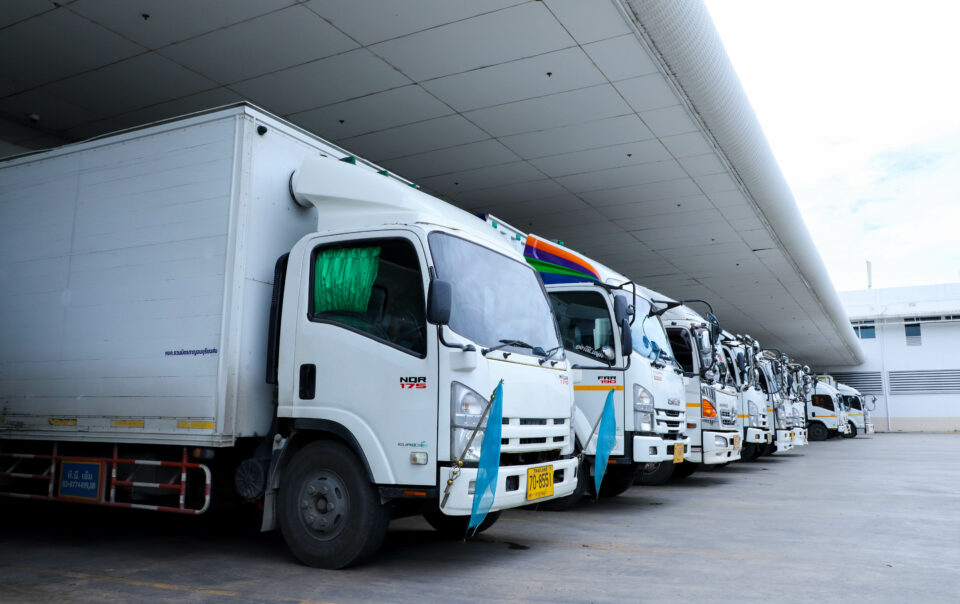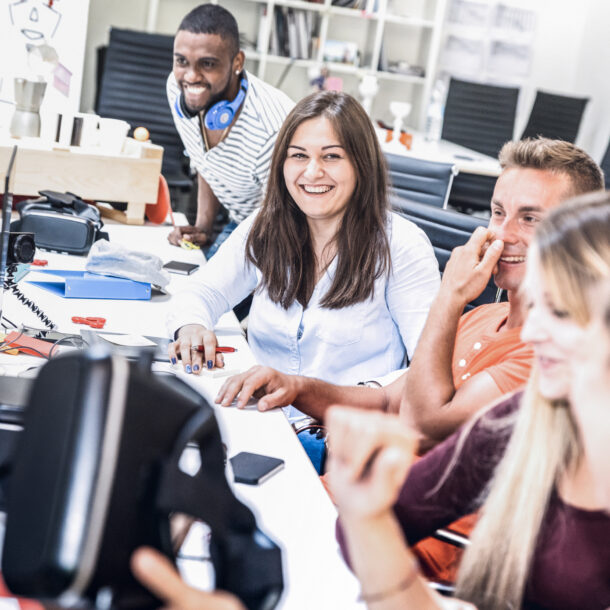
Nkosilathi Nyathi เด็กหนุ่มชาวซิมบับเว ที่กล้าลุกขึ้นมาสร้างความแตกต่างด้วยการนำเสนอแนวทางและวิธีการในการต่อสู้กับผลกระทบที่เกิดขึ้นจากการเปลี่ยนแปลงสภาพภูมิอากาศ หรือ Climate Crisis
หากเรามองย้อนกลับไปยังรุ่นพ่อรุ่นแม่ของเรา หรือย้อนไปไกลกว่านั้นหน่อย สักประมาณรุ่นปู่ย่าตายายของเราก็ได้ เมื่อมีการขับเคลื่อนเทคโนโลยีและนวัตกรรม สิ่งเหล่านี้มักจะกลายเป็นเรื่องน่ายินดีปรีดาไปเสียหมด เพราะมากับเรื่องความใหม่ ทันสมัย เราชอบในความสะดวกสบาย ยกตัวอย่างเช่น เรื่องของพลาสติก ซึ่งตอนนี้ก็เป็นเหมือนส่วนหนึ่งของชีวิตเราไปแล้วด้วยซ้ำ นี่ถ้าหากเรากินมันได้เราคงกินมันกันแล้วล่ะ หรืออันที่จริงเราได้กินมันเข้าไปแล้ว?
ตั้งแต่ตอนเรียนประถม แอดมินเองก็เคยมีชิ้นงานวาดภาพระบายสีรณรงค์ลดภาวะโลกร้อนมานับไม่ถ้วน แต่นั่นก็เป็นเพียงแค่การใช้กระดาษสร้างขยะเพิ่มเข้าไปอีก เพราะหลังจากตัดสินว่าของใครสวยที่สุดแล้ว การลดภาวะโลกร้อนเกิดขึ้นจริงก็แค่เพียงแค่ในรูปวาดเท่านั้น แต่รู้ไหมว่าในขณะที่เด็กประถมในไทยกำลังวาดรูปลดภาวะโลกร้อนเพื่อชิงรางวัลขนมห่อกันแล้ว ในอีกซีกโลกหนึ่งยังมีประเทศที่กำลังรับผลกระทบจากภาวะโลกร้อนที่ร้ายแรงกว่าในรูปที่เราวาดขึ้นเสียอีก
“นี่คือชีวิตประจำของตัวฉันเอง”
ลองนึกภาพเด็กนักเรียนเดินทางไกลกว่า 5 กิโลเมตรภายใต้แดดที่แผดเผาจนแทบจะไหม้เพื่อไปโรงเรียนทุกวัน ไม่มีต้นไม้สักต้นที่จะแผ่ร่มเงาให้เข้าไปหลบ ทุกอย่างว่างเปล่า การสอบปลายภาคถูกจัดขึ้นกลางแจ้งท่ามกลางความร้อนระอุ แถมพวกเขายังถูกคาดหวังให้ทำคะแนนให้ได้ดีเสียด้วย ถ้าบังเอิญพวกเขาเกิดคอแห้งขึ้นระหว่างวัน ไม่แปลกใจเลยถ้าพวกเขาเลือกจะทนจนถึงที่สุดก่อน เพราะการเดินไปแหล่งน้ำที่ใกล้ที่สุดหมายถึงการเดิน 4 ชั่วโมงเพื่อไปต่อคิวเข้าแถวที่ยาวจนสุดลูกหูลูกตาเพื่อรับน้ำเพียงแค่หยดสองหยด
“การเปลี่ยนแปลงสภาพภูมิอากาศทำให้ชีวิตเรายากขึ้น”
Nkosilathi Nyathi เด็กหนุ่มชาวซิมบับเว อาศัยอยู่เมืองที่เรียกว่าน้ำตกวิกตอเรีย ซึ่งเป็นหนึ่งในเจ็ดสถานที่สิ่งมหัศจรรย์ของโลก เขาใช้ชีวิตอยู่ในพื้นที่ที่ยากจนอยากชิโนทิมบาอย่างยากลำบาก นิทานอันโหดร้ายที่แอดมินได้เล่าให้ฟังด้านบน เทียบไม่ได้เลยกับชีวิตประจำของ Nkosilathi แต่เขาไม้ได้ประสบปัญหานี้เพียงแค่คนเดียวเท่านั้น แต่ยังมีชีวิตของเด็กหลายล้านคนทั่วแอฟริกา และชีวิตของเด็กอีกหลายล้านที่อาศัยอยู่ในพื้นที่เดียวกันกับเขาต่างก็ประสบปัญหาแบบเดียวกัน
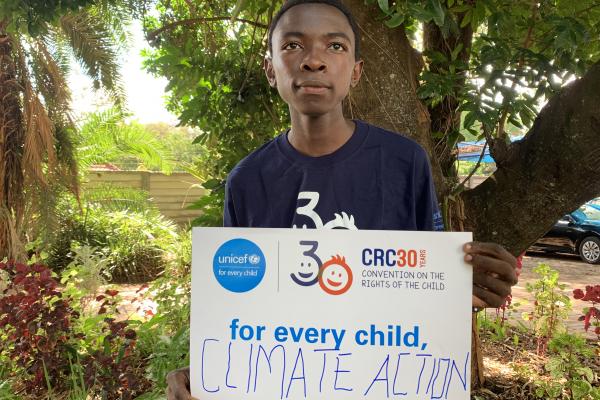
“ความอยุติธรรม คือ การเปลี่ยนแปลงสภาพภูมิอากาศส่วนใหญ่เกิดจากผู้ใหญ่ที่อาศัยอยู่ในประเทศที่พัฒนาแล้ว แต่ผลกระทบที่เกิดขึ้นกลับเกิดกับเด็กที่อาศัยอยู่ในประเทศที่กำลังพัฒนา”
Nkosilathi เล่าว่าตัวเขาเองสังเกตเห็นความเปลี่ยนแปลงของสภาพภูมิอากาศที่ค่อยๆ ชัดเจนขึ้นเรื่อยๆ ปัญหาภูมิอากาศที่ส่งผลถึงเศรษฐกิจและชีวิตของผู้คนในพื้นที่ ในบางช่วงของปี พวกเขาต้องเจอกันฝนตกรุนแรงที่ไร้วี่แววว่าจะหยุด คุณอาจจะคิดว่าในพื้นที่ที่แห้งแล้งคงต้องการน้ำ ฝนเหล่านี้ที่ควรจะเป็นเรื่องที่ดี แต่กลับเป็นการทำลายล้างที่สร้างความแสนสาหัสให้กับทุกคนในพื้นที่ มันชำระล้างหน้าดินที่เป็นพื้นที่เกษตรกรรมและคร่าชีวิตสัตว์เลี้ยงของพวกเขาไปจนหมดสิ้น
แต่ความน่ากลัวของสภาพอากาศมันยังไม่ได้จบแค่นั้น เมื่อพายุฝนที่รุนแรงเริ่มซาจนกระทั่งมันผ่านพ้นไป พวกเขาต้องพบกับความแห้งแล้งที่แทบจะเหมือนนรก ฟ้าหลังฝนของพวกเขาคือสัตว์ขาดน้ำจนตาย การขาดแคลนน้ำที่จะมาใช้ในการทำเกษตรกรรม และพื้นดินที่แห้งแตกระแหงจนไม่สามารถเพาะปลูกอะไรได้เลย
“ฉันอ่านหนังสืออย่างหวาดกลัวในวันนั้น”
ในปี 2560 รัฐบาลท้องถิ่นในเมืองของ Nkosilathi ประกาศห้ามเด็กทุกคนไปโรงเรียน เพราะมีพายุไซโคลนไดนีโอเข้าถล่มภูมิภาคที่เขาอาศัยอยู่ ในคืนนั้นเป็นคืนที่เขากำลังอ่านหนังสืออยู่พอดี สิ่งที่น่าหดหู่ใจกว่าพายุในคืนนั้นคือ สิ่งที่มันทำลายทิ้งเอาไว้ พายุทำลายบ้านเรือนไปกว่า 20,000 หลัง และผู้คนในเมืองกว่า 130,000 คน ต้องพลัดถิ่นฐานไร้ที่อยู่อาศัย และในอีก 2 ปีต่อมา พายุไซโคลนอิไดได้เข้าถล่มเข้าที่ประเทศของเขาอีกครั้ง ครั้งนี้พลังทำลายล้างของมันได้ก่อให้เกิดความสูญเสียอย่างมหาศาล ผู้คนล้มตายจำนวนมาก คนที่รอดได้รับผลกระทบที่หนักหนาสาหัส บ้านเรือนและโรงเรียนสลายหายไปกับพายุ เด็กนักเรียนจำนวนมากหมดโอกาสทางการศึกษา คำถามก็คือ พวกเขาผิดอะไร ทำไมพวกเขาต้องเจอกับเรื่องแบบนี้?
“การเป็นเด็กไม่ใช่เรื่องยาก แต่การเอาตัวรอดจากวัยเด็กด้วยสภาพภูมิอากาศที่เปลี่ยนแปลงเป็นเรื่องยากกว่า”
เพราะการเปลี่ยนแปลงสภาพอากาศที่เกิดขึ้น คนที่ทำไม่เคยถามว่าทำไมถึงเกิดขึ้น? พวกเขาพลาดหรือผิดที่ตรงไหน? และมันจะแก้ไขได้อย่างไร? เมื่อคนทำไม่เคยถาม คนที่รับผลกระทบอย่างเด็กในเจนเนอเรชั่นนี้จึงกลายเป็นคนตั้งคำถามแทน เพราะพวกเขากำลังเผชิญกับสิ่งที่พวกเขาไม่ได้ก่อ อีกทั้งความคาดหวังว่าพวกเขาจะรับมือและแก้ไขปัญหาเหล่านี้ได้อีก พวกเขาทำผิดอะไร ทำไมพวกเขาต้องเจอกับเรื่องแบบนี้?
“ความคิดเห็นของคนหนุ่มสาวผู้กระทำที่ขาดการรับฟัง”
เมื่อมีการแสดงความคิดเห็นและระดมสมองกันเพื่อรับมือกับสภาพภูมิอากาศที่เปลี่ยนแปลงไป ที่นั่งของผู้มีสิทธิ์ตัดสินใจ มักเป็นของผู้ที่ยังไม่เข้าใจในผลกระทบที่ตนได้รับอย่างเพียงพอ แม้แต่ผู้แสดงความคิดก็ยังมีเพียงแต่กลุ่มผู้ใหญ่เท่านั้น เด็กในเจนเนอเรชั่นนี้ ที่กำลังได้รับผลกระทบโดยตรงหรือบางคนได้รับผลกระทบมาตั้งแต่เกิดด้วยซ้ำ ไม่มีคนรับฟังพวกเด็กๆ เหล่านี้เลย เพียงเพราะการมีส่วนร่วมหรือการรับฟังถูกตัดสินจากอายุเท่านั้น
“สภาพภูมิอากาศที่เปลี่ยนแปลงเป็นวิกฤติสำหรับเด็กรุ่นนี้”
ลองนึกถึงเด็กสักคนที่ต้องเดินฝ่าฝนไปโรงเรียนเพียงเพราะเขาไม่มีเงินซื้อร่ม แต่เขายังคาดหวังที่จะผ่านเรื่องราวแย่ๆตรงนั้นไปได้ด้วยดี เด็กกำลังได้รับผลกระทบจากวิกฤติในครั้งนี้เต็มๆ สิ่งที่แย่ที่สุดของความโชคร้ายนี้ คือผลกระทบที่แสนสาหัสมักเกิดกับคนที่ไม่ได้ก่อเรื่องขึ้น เด็กในประเทศที่กำลังพัฒนาหรือขาดการพัฒนากำลังทนทุกข์กับผลกระทบที่เกิดจากสิ่งที่เขาไม่ได้ทำ นีก็เป็นอีกครั้ง ที่ต้องถามว่า พวกเขาทำผิดอะไร ทำไมพวกเขาต้องเจอกับเรื่องแบบนี้?
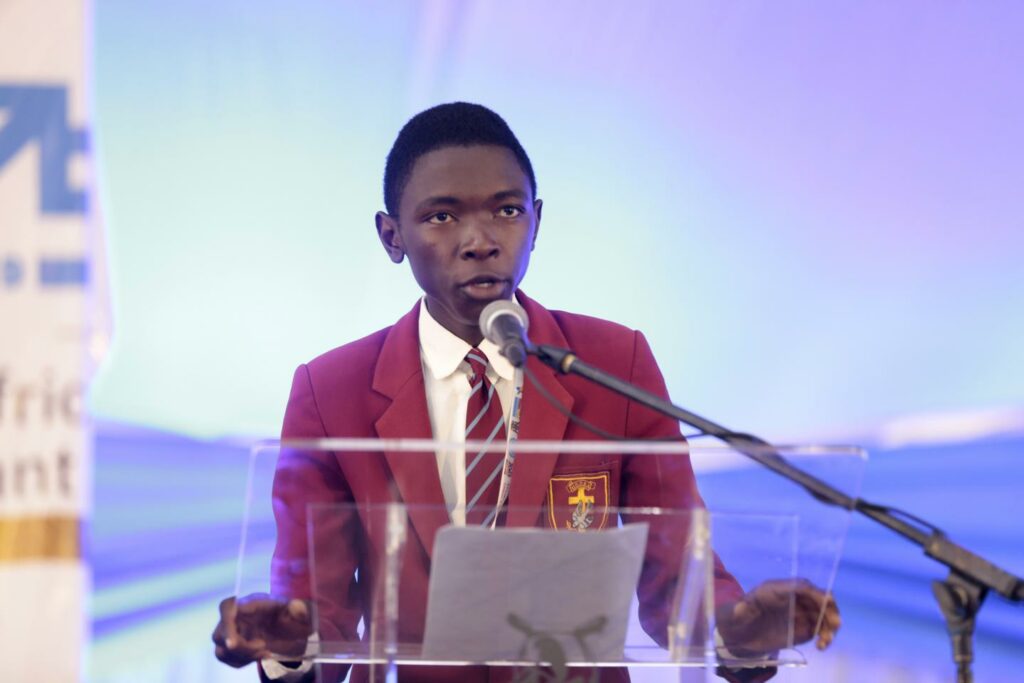
บทสรุป
หากถามว่าทำไมจู่ๆ กระแสรณรงค์เกี่ยวกับสภาพภูมิอากาศที่เปลี่ยนแปลงถึงดูชัดเจนขึ้น ทั้งในแง่ของนามธรรมและรูปธรรมมากกว่าที่เคย ก็เพราะว่าเด็กรุ่นนี้มีความกังวลเกี่ยวกับสภาพแวดล้อมมากกว่ารุ่นพ่อรุ่นแม่ของพวกเขา พวกเขากำลังดำเนินชีวิตร่วมกับสภาพภูมิอากาศที่เปลี่ยนแปลงไป ซึ่งพ่อแม่ของพวกเขาไม่ได้เจอ
ไม่ว่าคุณจะเป็นคนเจนเนอเรชั่นอะไรหรืออายุเท่าไร? โปรดคิดไว้เถอะว่าทุกวินาทีที่คุณได้นอนหลับอย่างสบายใจอาจจะเป็นคำคืนที่เด็กคนหนึ่งกำลังอ่านหนังสืออยู่ท่ามกลางความหวาดกลัว ในขณะที่พายุกำลังพัดผ่านบ้านของเธอ หรือในตอนเช้าที่คุณขับรถไปทำงานและฟังเพลงอยู่บนรถอย่างสบายใจ อาจเป็นช่วงเวลาเดียวกันกับเด็กคนหนึ่งที่ต้องเดินฝ่าฝนเพื่อไปเรียนหนังสือด้วยชุดและหนังสือที่เปียกโชก
มันถึงเวลาแล้วที่เราจะแสดงความรับผิดชอบในสิ่งที่ทำ เพราะในขณะเดียวกันมีผู้บริสุทธิ์เป็นจำนวนมากกำลังรับผลที่เราก่อเอาไว้ เราสามารถรักษาโลกของเราด้วยวิธีการแก้ปัญหาที่รับผิดชอบ ตระหนักถึงความเปลี่ยนแปลงของสภาพภูมิอากาศ ตระหนักถึงความรุนแรงที่มันสามารถก่อได้ และตระหนักถึงความเดือดร้อนของเพื่อมนุษย์ อย่างน้อยๆ ก็ควรเริ่มทำเพื่อรักษาอนาคตเอาไว้ให้ลูกหลานของเรา
“ความโหดร้ายมันเกิดขึ้นเมื่อคุณคิดถึงอนาคตของเด็กรุ่นถัดไปน้อยลง เด็กรุ่นนี้คือรุ่นที่ได้รับผลกระทบจากการเปลี่ยนแปลงสภาพภูมิอากาศมากที่สุด เพราะฉะนั้นพวกเขาจึงควรมีโอกาสได้รับสิทธิ์ เสียง และแสงในการต่อสู้มากที่สุด”
Nkosilathi Nyathi: A next-generation solution to the climate crisis | TED
ข้อมูลเพิ่มเติม:
UNICEF appoints young Zimbabwean as Youth Climate Advocate
Nkosi Climate Change Journey to COP25
บทความแนะนำ :
Solving Hunger by Solving Food Waste – หนทางแก้ปัญหาสู่ความยั่งยืน

